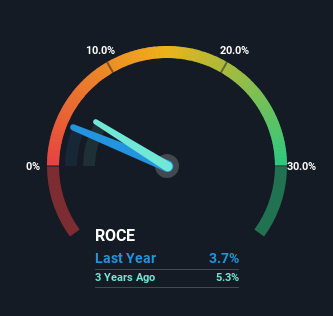- Spain
- /
- Renewable Energy
- /
- BME:ENER
Here's What's Concerning About Ecoener's (BME:ENER) Returns On Capital
What are the early trends we should look for to identify a stock that could multiply in value over the long term? In a perfect world, we'd like to see a company investing more capital into its business and ideally the returns earned from that capital are also increasing. This shows us that it's a compounding machine, able to continually reinvest its earnings back into the business and generate higher returns. Having said that, from a first glance at Ecoener (BME:ENER) we aren't jumping out of our chairs at how returns are trending, but let's have a deeper look.
Return On Capital Employed (ROCE): What Is It?
If you haven't worked with ROCE before, it measures the 'return' (pre-tax profit) a company generates from capital employed in its business. To calculate this metric for Ecoener, this is the formula:
Return on Capital Employed = Earnings Before Interest and Tax (EBIT) ÷ (Total Assets - Current Liabilities)
0.037 = €19m ÷ (€580m - €76m) (Based on the trailing twelve months to December 2023).
So, Ecoener has an ROCE of 3.7%. In absolute terms, that's a low return and it also under-performs the Renewable Energy industry average of 9.5%.
See our latest analysis for Ecoener

In the above chart we have measured Ecoener's prior ROCE against its prior performance, but the future is arguably more important. If you're interested, you can view the analysts predictions in our free analyst report for Ecoener .
What The Trend Of ROCE Can Tell Us
We weren't thrilled with the trend because Ecoener's ROCE has reduced by 44% over the last five years, while the business employed 187% more capital. That being said, Ecoener raised some capital prior to their latest results being released, so that could partly explain the increase in capital employed. It's unlikely that all of the funds raised have been put to work yet, so as a consequence Ecoener might not have received a full period of earnings contribution from it.
The Key Takeaway
We're a bit apprehensive about Ecoener because despite more capital being deployed in the business, returns on that capital and sales have both fallen. Investors haven't taken kindly to these developments, since the stock has declined 24% from where it was three years ago. With underlying trends that aren't great in these areas, we'd consider looking elsewhere.
If you'd like to know more about Ecoener, we've spotted 3 warning signs, and 2 of them are a bit unpleasant.
For those who like to invest in solid companies, check out this free list of companies with solid balance sheets and high returns on equity.
Valuation is complex, but we're here to simplify it.
Discover if Ecoener might be undervalued or overvalued with our detailed analysis, featuring fair value estimates, potential risks, dividends, insider trades, and its financial condition.
Access Free AnalysisHave feedback on this article? Concerned about the content? Get in touch with us directly. Alternatively, email editorial-team (at) simplywallst.com.
This article by Simply Wall St is general in nature. We provide commentary based on historical data and analyst forecasts only using an unbiased methodology and our articles are not intended to be financial advice. It does not constitute a recommendation to buy or sell any stock, and does not take account of your objectives, or your financial situation. We aim to bring you long-term focused analysis driven by fundamental data. Note that our analysis may not factor in the latest price-sensitive company announcements or qualitative material. Simply Wall St has no position in any stocks mentioned.
About BME:ENER
Ecoener
Ecoener, S.A., though its subsidiaries, engages in the generation of renewable energy business in Spain, Honduras, Guatemala, Dominican Republic, Colombia, and internationally.
High growth potential with very low risk.
Market Insights
Community Narratives



